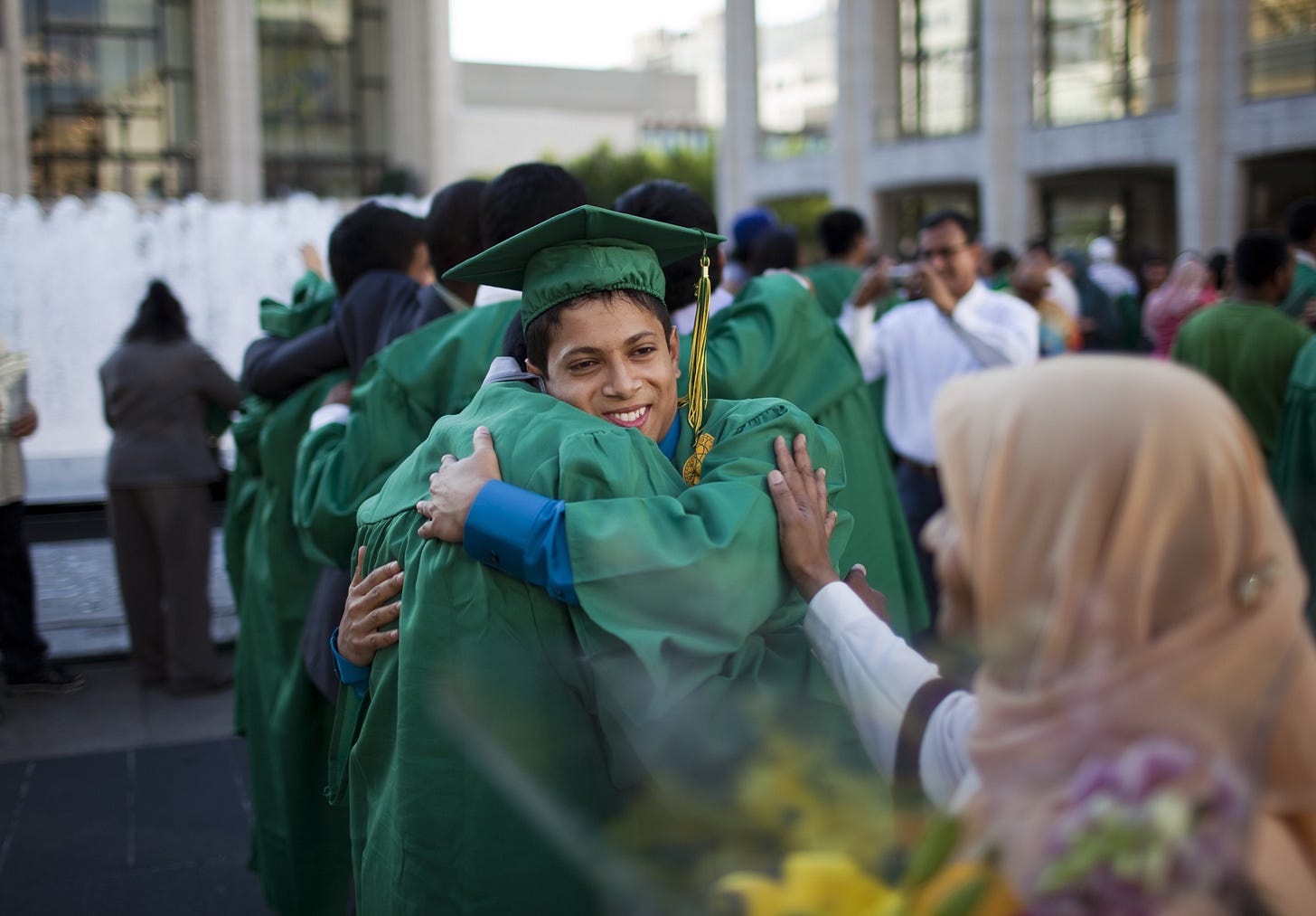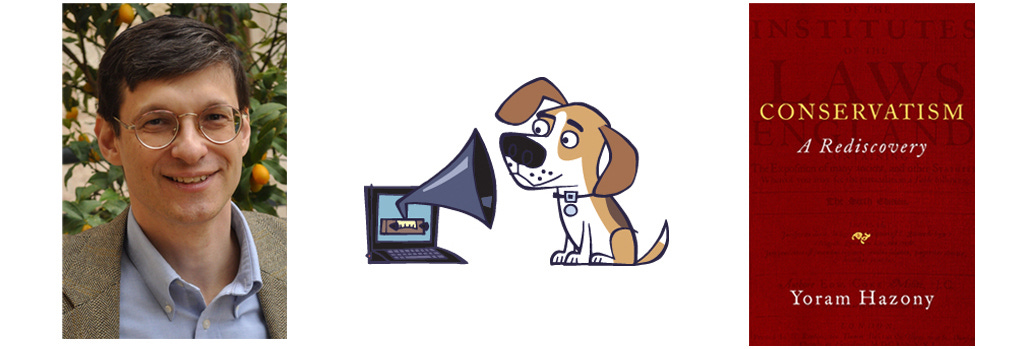The Placebo Of Affirmative Action
It's time to abolish a distraction from the actual causes of racial inequality.

“Rarely have we been so surprised by a focus group,” wrote the New York Times’ Patrick Healy and Adrian Rivera last month. The two were shocked that the twelve college students they’d picked for a Gen-Z focus group turned out to hold some deeply skeptical views on affirmative action.
When asked if they supported a program that used “race or ethnicity as one of many criteria in admissions” to college, only one put up his hand. Among the reasons the others (of both sexes and most races) gave for opposing the use of race:
“I feel like, by introducing affirmative action, that would further otherize that population that’s receiving that benefit because it could be looked at as, ‘Oh, look at that. They’re only here because of this.’” … “The biggest issue with affirmative action is that it implies that people of color wouldn’t be able to get that position on their own” … “Affirmative action really doesn’t fix the overall socioeconomic disparities between the groups that lead to those problems in the first place”
And there you have the issue — in the simplest form. In a civilization like America, rooted in the rights and opportunities of the individual, no one really wants to believe they achieved what they achieved simply because they are a member of a group.
It’s a stigma. And this is particularly true for a member of a racial minority — someone who may well have overcome low expectations to succeed in school, worked harder than their peers, triumphed over a tough background or broken family and resisted the easy out of resentment. To do all that and then suffer the indignity of others doubting your right to be at an elite college because of your race must be psychologically excruciating.
And for a country that in the mid-1960s had just abolished its pernicious system of formal race discrimination, it was also excruciating to subsequently erect a new system of formal race discrimination — but this time in reverse. That’s why affirmative action was first described as a temporary evil — rather than an ultimate good.
It was self-evidently unjust, the argument went — but a brief injustice was required to counteract centuries of a deeper injustice. How brief? “We expect that 25 years from now, the use of racial preferences will no longer be necessary to further the interest approved today,” wrote Justice O’Connor in the 5-4 Grutter decision of 2003 — 25 years after the Supreme Court upheld affirmative action in Bakke, another 5-4 vote. Even when the policy was permitted, it had to be “subject to continuing oversight to assure that it will work the least harm possible to other innocent persons competing for the benefit.”
In the 1978 Bakke decision, the Court had adjusted affirmative action to end crude quotas, but justified it anew by saying it fostered “diversity” on campuses — which was in itself a legit educational goal. But how do you define “diversity”? Certainly not of ideas: since affirmative action arrived, elite colleges have become ever more mono-cultural and ever more untethered to the society as a whole. Of sex? Affirmative action helped women gain a footing in colleges, but soon enough, they thrived on their own, and men became the fast-shrinking minority.
So it’s almost all about race. Which means to say: race discrimination, however you dress it up. The pre-Bakke “quotas” and post-Bakke “diversity” methods are hard to distinguish in practice, as some liberals were honest enough to say at the time. “In principle,” Ronald Dworkin wrote, “they affect a white applicant in exactly the same way — by reducing his overall chances.” Today, that’s less the case than it used to be, because whites are no longer dominating the test scores. It’s now a minority group, Asian-Americans, whose overall chances of getting into college have been reduced.
How badly reduced? The looming Supreme Court cases brought by Students for Fair Admissions have finally forced elite colleges to hand over the data. Harvard’s offering tells a tale: in the top decile, a white applicant with the same score as an Asian-American is 1.2 times as likely to get in, and a black applicant more than four times as likely. Lower down in the fourth decile, a white with the same score as an Asian has double the chance of getting in, a Hispanic five times, and an African-American fourteen times. If you look at admissions to medical schools, you’ll find that an African-American applicant with the same MCAT score as an Asian-American has almost ten times the likelihood of being accepted. Medical school.
I’m sorry, but there is simply no way to arrive at these results without conscious, systemic anti-Asian race discrimination.
The most recent data suggest that Asian-American scores have recently risen again, making the discrimination needed to keep them out ever-more severe. Jay Caspian Kang notes that “in 2018, for example, Asian American students, on average, scored 100 points higher on the SAT than white students. Just three years later, in 2021, that gap had risen by over 25 percent, to 127.” The ratchet is relentless: the better Asian-American kids do, the more they will have to be discriminated against.
No one likes this injustice. To be sure, polls show a majority of Americans in favor of “affirmative action” as a general concept (we all prefer diversity in the abstract), but when asked specifically about using race as a factor in college admissions, huge majorities oppose it. A Pew survey this year found that only 7 percent of Americans believe race should be a major factor in college admissions, 19 percent a minor factor, and 74 percent said race should not be considered at all. A Harvard poll in 2016 found that only 18 percent of Millennials agreed with minority preferences, while 42 percent disagreed (37 percent were neutral).
A recent David Shor analysis found that, among Democratic policies, affirmative action was among the most unpopular — with even less support than “defund the police.” More tangibly: on the nine occasions the policy has been put to the electoral test since 1996, it has lost eight times, most recently in super-liberal California in 2020.
What would happen if the Supreme Court strikes it down? You’d think it would be the dawn of a new Jim Crow, to hear some hysterics. But we already have the case of California, which ended affirmative action in 1998, and we can see what happened. Between then and 2015, a NYT survey found that the Hispanic share of freshmen in the UC system rose from 13 to 36 percent at Irvine, 13 to 24 percent at UCLA, and 17 to 31 percent at Santa Barbara. Berkeley is the least impressive, but even there, without affirmative action, Hispanics went from 9 to 15 percent. Yes, the Hispanic population was also growing fast — but their campus presence was growing in classic immigrant fashion.
What happened to African-American representation? It fell or remained steady. About 5 percent of Californians are black — and the percentage of black freshmen in the UC system ranged from 1 to 4 percent in the NYT survey. (If you include “multiracial,” that number ranges from 7 to 13 percent.) Not great. In the affirmative action Ivies, the average is 9 percent black — from a national pool of around 13 percent. That’s not a huge difference.
And the small gain for African-Americans (many wealthy and immigrant) in elite colleges has to be balanced by more than just the injustice of what is being done to (often poor) Asian-Americans. It has to be weighed against the costs of legitimizing the principle of race discrimination; and by the psychological costs to black and Hispanic students of never being free of the taint that they somehow don’t deserve their successes.
Above all, these Ivy League performances of “racial equity” are a means of distracting us from the real roots of resilient inequality of African-Americans: single-parent homes, higher rates of poverty and isolation, young lives devastated by crime, poor schooling, overwhelmed, over-worked mothers, and a cultural resistance to learning as a symbol of “acting white.”
It is so much easier for white elites to flaunt their impeccable “diversity” credentials by discriminating against Asians than to tackle these much harder, deeper realities. Restoring the power of black fatherhood, reforming schools, supporting working mothers, providing adequate daycare, better policing: any single one is a challenge. But you don’t reverse racial inequality by ducking the core issues and rigging the educational system on the back end. It’s not morally serious; it breeds racialist thinking; it creates crippling insecurity among beneficiaries and racial resentment among the losers. It’s corrupting to the academic project — because it makes your identity as important as your intellect. And its logic barrels toward Kendi-style social engineering based on increasingly anachronistic concepts of race.
And that’s the real tragedy of affirmative action: it takes the very racial categories created by the system of “white supremacy” and freezes them in perpetuity. The category of “multiracial” both describes more and more Americans and yet has no place in affirmative action. The whole “equity” project is not about transcending these increasingly irrelevant categories; it’s about entrenching them forever, in a kind of intergroup zero-sum warfare that leads directly to the kind of rhetoric we just overheard at the Los Angeles City Council. And this racial warfare has less and less relevance on the actual ground:
About three in 10 Asian newlyweds were married to someone from a different race or ethnicity in 2015, as were around one in four Hispanics and roughly one in five Black Americans.
The logic of affirmative action is racist and rooted in a toxic past. It is harming poor immigrants, punishing hard workers, and wreaking psychological havoc among its beneficiaries. It is the solution to a fake problem — the ludicrous idea that Ivy League colleges are white supremacist institutions — and a distraction from the real and far more intractable ones.
Glenn Loury, who once supported affirmative action, recently said:
Do you want representation or do you want equality? … Are you interested in developing the human potential of the African-American population? Or are you merely interested in covering your ass? By being able to present an optics that shows that you’re a diverse and inclusive institution?
No, I’m not against affirmative action. But I’m against hypocrisy. I’m against condescension. And I’m asking people to imagine what kind of country we are going to be. Really? We are going to do this for another 30 years? We are going to do this for another 50 years?
I hope we don’t. I really do.
(Note to readers: This is an excerpt of The Weekly Dish. If you’re already a subscriber, click here to read the full version. This week’s issue also includes: an in-depth discussion with natcon Yoram Hazony on the loss of civic religion; a new transcript for our episode with Francis Fukuyama; reader dissents over my piece on Herschel Walker; seven notable quotes from the week in news; 13 pieces we recommend by other Substackers on a range of topics; a Mental Health Break of James Brown set to heavy metal; two autumnal views from your window; and the results of the View From Your Window contest — with a new challenge from the desert. Subscribe for the full Dish experience!)
From a proud subscriber and prouder American:
I’m now very much back on my feet. Since you gifted me this year’s subscription, I decided to gift one to my wife as a thank you. And because I think the Dish is brilliant and inspirationally brave.
Re: the problem with the Jon Stewart “debate” — I’m also an immigrant, my family was lower working class in Mexico, and I moved here for university. I’m now living the American Dream to its fullest. To assert that we are living in a white supremacist society devalues (and insults) all the great accomplishments of *pick your melanin expression profile* to the United States. Some people need to stop feeling sorry for me — and others who look like me — and directly help the communities that need it. There is a lot of work to be done!
New On The Dishcast: Yoram Hazony
Yoram is a philosopher, Bible scholar, and political theorist. He founded the Shalem Center, a research institute in Israel, and he’s currently president of the Herzl Institute in Jerusalem and serves as chairman of the Edmund Burke Foundation in DC. The author of many books, including The Virtue of Nationalism, his most recent is Conservatism: A Rediscovery. He is one of the most compelling writers in the “post-liberalism” camp on the right. I think you’ll find I challenged him on everything.
Listen to the episode here. There you can find two clips of our convo — on how wokeness is a threat to civic religion, and how Trump can be a tool to reclaim Christianity. That link also brings you to a bunch of listener commentary on our episodes with Sohrab Ahmari, Christopher Hitchens, Richard Reeves and more — including a reader who articulates his disgust over homosexuality. Also, a new transcript just dropped: Fukuyama on the threats to liberal democracy.
Next, here’s a listener on last week’s chat with Frank Bruni on the silver linings of suffering:
Loved this episode of the Dishcast! It helps me keep my sanity to realize that I share the concerns of others. Always look forward to Friday when your podcast comes out. Thank you guys!
Browse the entire Dishcast archive for an episode you might enjoy.
Dissents Of The Week: Policy Over Principle
A reader takes an instrumentalist approach to Herschel Walker:
It is past time to pretend that character, or even intelligence, matters in most political races. The issue is policy: how will the candidate vote on the matter before them? We can predict both Warnock and Walker will vote 99% of the time with their party, even if they were convicted felons who had flunked out of high school. That’s because the party invariably controls what comes up for legislation. There might be two or three senators who buck the party when it really matters, such as Manchin or Romney, but we know Warnock will vote to tax, spend, and institute racial essentialism, while Walker will oppose them.
It’s time to stop using the rhetorical device that all either the GOP or Democrats care about is “power.”
Read the rest of that dissent, and my response, along with three others, here. As always, please keep the dissents coming: dish@andrewsullivan.com.
ICYMI
This week I talked to Megyn Kelly about the Queen and our culture of narcissism:
In The ‘Stacks
This is a feature in the paid version of the Dish spotlighting more than a dozen of our favorite pieces from other Substackers every week. This week’s selection covers chips in China, assisted suicide, the firebombings of pro-life clinics, and many more topics. Below is one example, followed by a brand new substack:
Now that abortion has gone to the states and ballot boxes, maybe feminists shouldn’t sideline men so much. Nick Coccoma, for one, tells his story of becoming a pro-choice Christian.
Tulsi Gabbard joins the island of misfit toys with a ‘stack on why she’s leaving the Democratic Party.
You can also browse all the substacks we follow and read on a regular basis here — a combination of our favorite writers and new ones we’re checking out. It’s a blogroll of sorts. If you have any recommendations for “In the ‘Stacks,” especially ones from emerging writers, please let us know: dish@andrewsullivan.com.
The View From Your Window Contest
Where do you think it’s located? Email your guess to contest@andrewsullivan.com. Please put the location — city and/or state first, then country — in the subject line. Proximity counts if no one gets the exact spot. Bonus points for fun facts and stories. The winner gets the choice of a VFYW book or two annual Dish subscriptions. If you are not a subscriber, please indicate that status in your entry and we will give you a free month subscription if we select your entry for the contest results (example here if you’re new to the contest). Happy sleuthing!
The results for last week’s window are coming in a separate email to paid subscribers later today. From a sleuth last week:
Finally! After a year plus or so of being a paid subscriber, I’m finally able to locate the exact address of the VFYW! In under ten minutes no less — take that, Chini! Ok, so narrowing it down to the exact room/window of a large hotel is a whole ‘nother story … but I’ll take pleasure in this little win today :)
BTW, I’ve always considered myself a centrist when it comes to politics, maybe slightly right leaning (more so these days), and it’s been an absolute pleasure reading your articles and gaining your insights, not to mention struggling through all the weekly VFYWs. I first heard about you from the Joe Rogan show during the pandemic, as he was talking up Substack and mentioning some of the best journalists there (you, Taibbi, and Greenwald specifically). Best money I’ve ever spent. Thanks for all you do!
See you next Friday.



